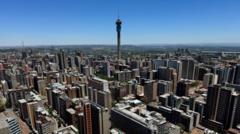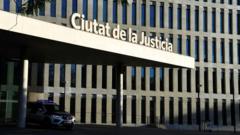**This article explores Johannesburg's remarkable transformation over the years, highlighting community efforts, new developments, and ongoing challenges as the city struggles for a brighter future.**
**Johannesburg’s Transformation: From Crime Epicenter to Resilient City**

**Johannesburg’s Transformation: From Crime Epicenter to Resilient City**
**A shining example of urban regeneration emerges as Johannesburg shakes off its troubled reputation.**
Johannesburg, once notorious for crime and dilapidation, is steadily reinventing itself as a beacon of urban revival. Central to this transformation is Ponte Tower, an iconic structure that stands as a testament to the city’s volatile yet hopeful journey. Opened in 1975, Ponte Tower, once the tallest residential building in Africa, faced overwhelming crime in the 1980s, becoming a hideout for gangs and a dumpster for unwanted refuse.
Delight Sithole, who conducts tours of the tower, recalls a harrowing era when “the building got hijacked...with trash accumulating to the 14th floor.” Former resident Sifiso Zikhali, representing the non-profit Dlala Nje, echoed similar sentiments about the pervasive fear residents had towards their surroundings. At one point, Johannesburg was branded as one of the world's most dangerous cities, deeply affecting public perception.
However, the tides began to turn around 15 years ago following the successful hosting of the FIFA World Cup. Slowly, former residents and newcomers alike returned to the city, invigorated by new possibilities—today, Ponte Tower operates at nearly 75% occupancy. Despite this recovery, Johannesburg continues grappling with pressing issues, including high crime rates and a looming water crisis.
The landscape of Johannesburg is also marked by rampant “hijacked” buildings, as evidenced by a recent disaster in the Central Business District where a fire tragically claimed nearly 80 lives. Amidst these challenges, property company Ithemba, an embodiment of "hope" in Zulu, is gaining momentum, focusing on redeveloping the city. Senior manager Alan Tait asserts that the demand to live in Johannesburg’s CBD is “phenomenal,” with Ithemba leasing 7,200 properties and aspiring to double that number soon.
A recent initiative spearheaded by JoziMyJozi aims at revitalizing the urban environment, which suffered from long periods of load-shedding. New lighting initiatives and community-led projects seek to restore a sense of safety and civility throughout the city. CEO Bea Swanepoel emphasizes the need for visible improvements to inject hope back into residents' lives.
As Johannesburg prepares to host the upcoming G20 summit, focus will increase on the metropolis, potentially attracting investments once again. While the challenges are formidable, local leaders like Zikhali remain optimistic. “This is our city, and whatever we face, we need to at the end find a solution for it,” he asserted from the 51st floor of Ponte Tower, embracing a future of continuous regeneration and potential.
Johannesburg's narrative is evolving; the city aspires to be mentioned alongside global giants like London and New York, inspired by the vision that change is indeed possible when communities come together to reclaim their spaces.





















